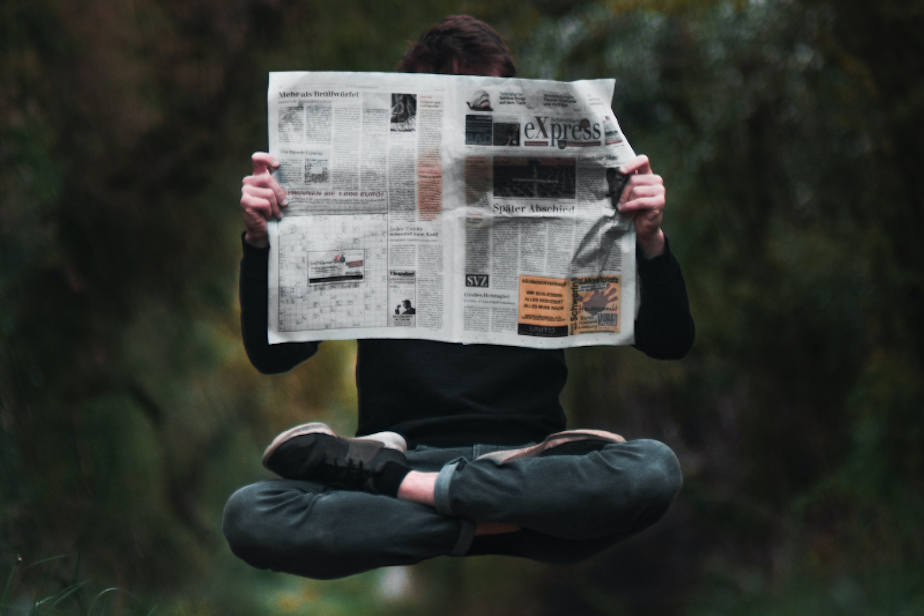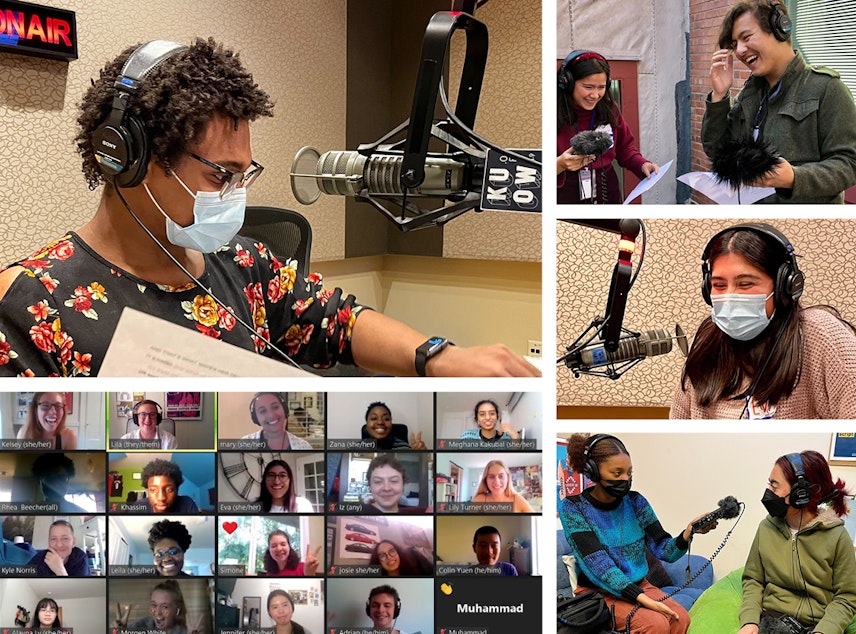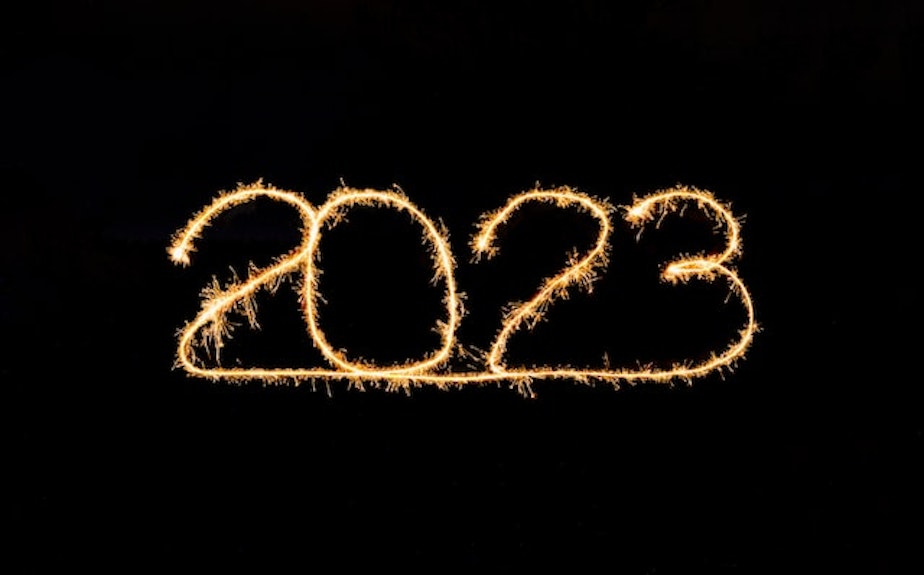Go on a healthy news diet in 2023: Today So Far

A challenge to TSF readers as we start 2023: Go on a healthy informational diet, avoid click bait and sensational "news," and even take a break from news consumption every now and then. Yep. I just said that.
This post originally appeared in KUOW's Today So Far newsletter for January 3, 2023.
Welcome to the first newsletter of 2023. As such, I'd like our TSF community to move into the new year with a sort of mission. While a lot of folks are happy to leave 2022 behind, there is a Seattle Now segment that has stuck with me over the past few months. I keep returning to it and considering how to best consume news, and how to best provide it to you. It's something I am taking with me into the new year as I think about staying healthy and informed.
KUOW's Jeannie Yandel interviewed journalist and columnist Amanda Ripley in July. Despite being a journalist herself, Ripley found herself, to some degree, purposefully avoiding news.
"There were a lot of headlines of what might happen, sort of anticipatory dread, which I think is the definition of an anxiety disorder," Ripely said. "I’m not a psychologist, but I found myself (asking), ‘Why am I reading these stories? I’m just getting more and more worried…’”
So she started trying different approaches to news consumption, such as not reading news in the morning, but “nothing really seemed to be the right balance of feeling informed, but also not feeling paralyzed by despair.” In Ripley's opinion, humans "really do need, just like they need water, hope, agency, and dignity. Those are things that, interestingly, are present in every single story that I’ve reported, but I didn’t always include them in the story. It’s not that they don’t exist in real life and real neighborhoods, but it’s not how we think about storytelling … but it’s those three things … that humans need to get up in the morning.”
I can relate. I also avoid the news, sometimes. Yes, me, someone who works in journalism, and writes a newsletter, and more than that, someone who works in online media. Sorry to all my news media colleagues who just collectively gasped. Obviously, as KUOW's newsletter writer, I have to at least be up-to-date each morning. But if I take a weekend with Nina and Cosmo, I'm turning off my notifications. I also take time to engage in non-news activities and let my brain breathe. This is OK, for me and for you. The news will be there when you get back. Go ahead, take a walk, call a friend just to chat, pick up that hobby you always say you're going to do.
Sponsored
If I wanted to, right now, I could get you to click. There is an easy recipe for clicks. Start with a sensational headline that tells you a lot and nothing at the same time, add a dollop of fear, a pinch of culture war, stir in a little frustration, and top it off with a few facts (not too much) to help it go down as news and information. There are variations of this recipe, but that's the basic idea.
Just as Ripley cited "water" as essential for our bodies, I'd like to add that healthy, nutritious news is essential for our minds and spirits. The information we consume is a lot like food we choose to consume. A good chef knows that a combination of salt, fat, and sugar will entice your taste buds and keep you biting. But there are plenty of others out there willing to package these ingredients in an unhealthy mix, often for quick, cheap consumption. News and information can be prepared in a similar, cheap way. With my friends, I call this "fast news," the informational equivalent of a fast food diet. Sure, you're consuming, but the end result might not be healthy.
I know the fast news recipe well, because I have been asked to cook it up myself in my career as an online content producer (a lot of websites have content quotas and a focus on numbers). I should note that I'm not talking about breaking news that needs to be reported ASAP. I'm talking cheap, sensational information with the primary focus of capturing your attention. In other words, let's choose to eat our "vegetables" in 2023. A healthy informational diet can do wonders for your mind and spirit. It's also good for fending off misinformation and disinformation. And it may help to separate news and opinion.
What does this all mean? There comes a time when we have to say, "No, I should not eat that," or when folks say, "No drinking for dry January." Choose information that is prepared well. If it tastes sensational, then it might be lacking some informational nutrients — just say, "No, I won't click on that" or perhaps, "I'm going to double check that information." Do you really, super agree with what your reading? Try challenging yourself by engaging information from a different angle. Ask yourself if information is news or opinion or other. And no matter how aggravating it is, no matter how much it makes you want to scream, "I can't believe that! What in the world!?" don't click the bait.
As we look forward into 2023, many of us making resolutions or aiming to adopt new, healthy habits, my challenge to TSF readers is to go on a healthy information diet. That means directing your attention at healthy sources, and avoiding misinformation and cheap information (click bait). Diversify your diet and avoid eating in an echo chamber. Develop an awareness every time you encounter information or news — whether it comes from a friend, foe (hopefully you don't have any foes), website, social media post, or those videos they're now playing at gas stations while you pump gas.
Sponsored
And while you're at it, keep us at KUOW on our toes and help us uncover perspectives, insights, and information you feel we can do better with.
Know that you don't have to constantly consume the news, and when you do, make smart choices about the news you give your time to. My gamble here is that by engaging a more balanced informational diet, we can be informed, engaged, and not feel "paralyzed by despair."
To help cleanse the palate, here are a few articles for consideration from KUOW's newsroom:
- Why misinformation is 'sticky' and sometimes easy to fall for
- Can you believe it? (You probably will)
- KUOW's misinformation toolkit
- SIFT through reporting
- Election misinformation works harder
- KUOW's mission and values, and effort to create a more informed public
- Provide feedback to KUOW
AS SEEN ON KUOW
Sponsored

DID YOU KNOW?
January 3 is a big day for U.S. politics.
On this day in 1957, Dalip Singh Saund became the first Asian American, Indian American, and the first Sikh to become a member of Congress. He was also the first person elected to Congress who didn't follow an Abrahamic religion. He represented California's 29th District.
Sponsored
Two years later, in 1959, George A. Kasem entered Congress as its first Arab American. He represented California's 25th District.
On the same day in 1959, Alaska was officially admitted to the union. President Eisenhauer signed a proclamation making it the 49th state, and the nation's largest state.
ALSO ON OUR MINDS

Sponsored
Forget flying cars. When scientists and sociologists in 1923 offered predictions for what life might look like in a hundred years, their visions were more along the lines of curly-haired men, four-hour workdays, 300-year-old people and "watch-size radio telephones." Here are a few predictions for 2023, according to the people of 1923.

